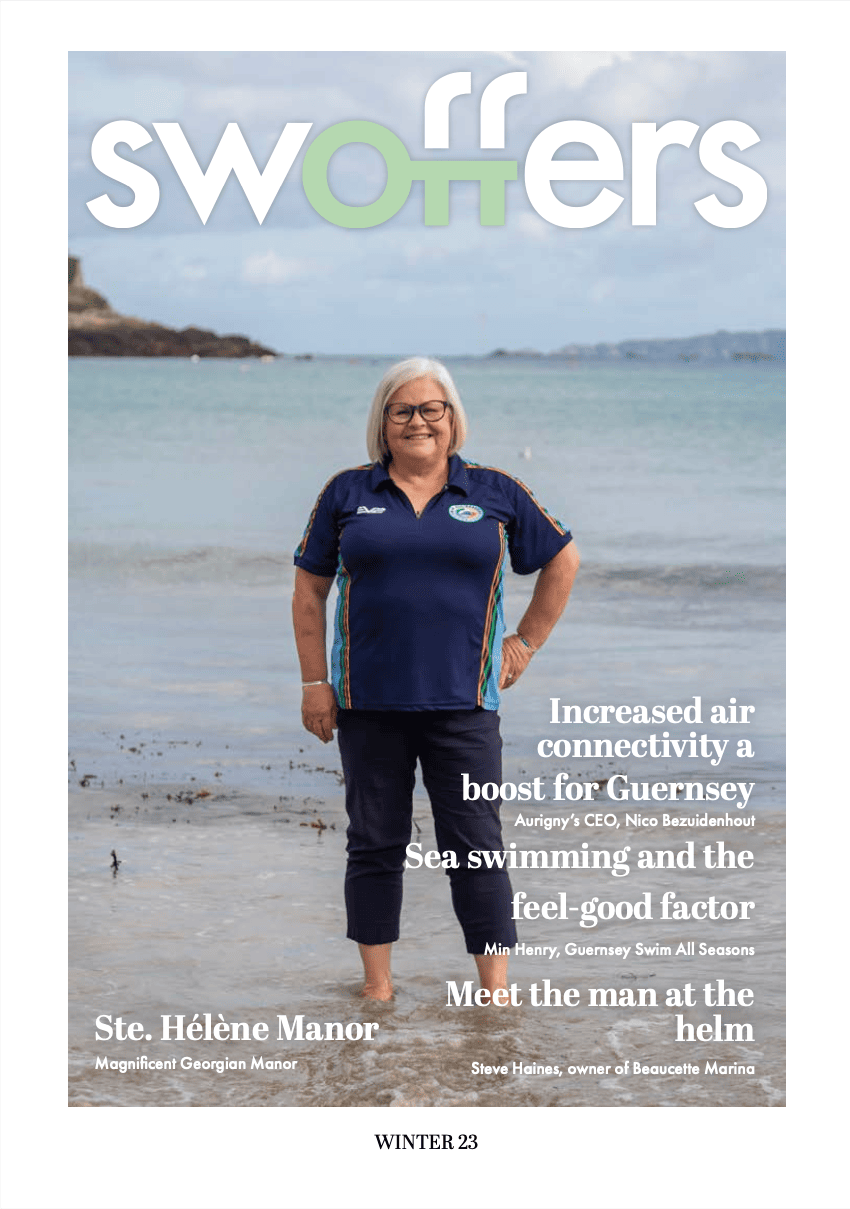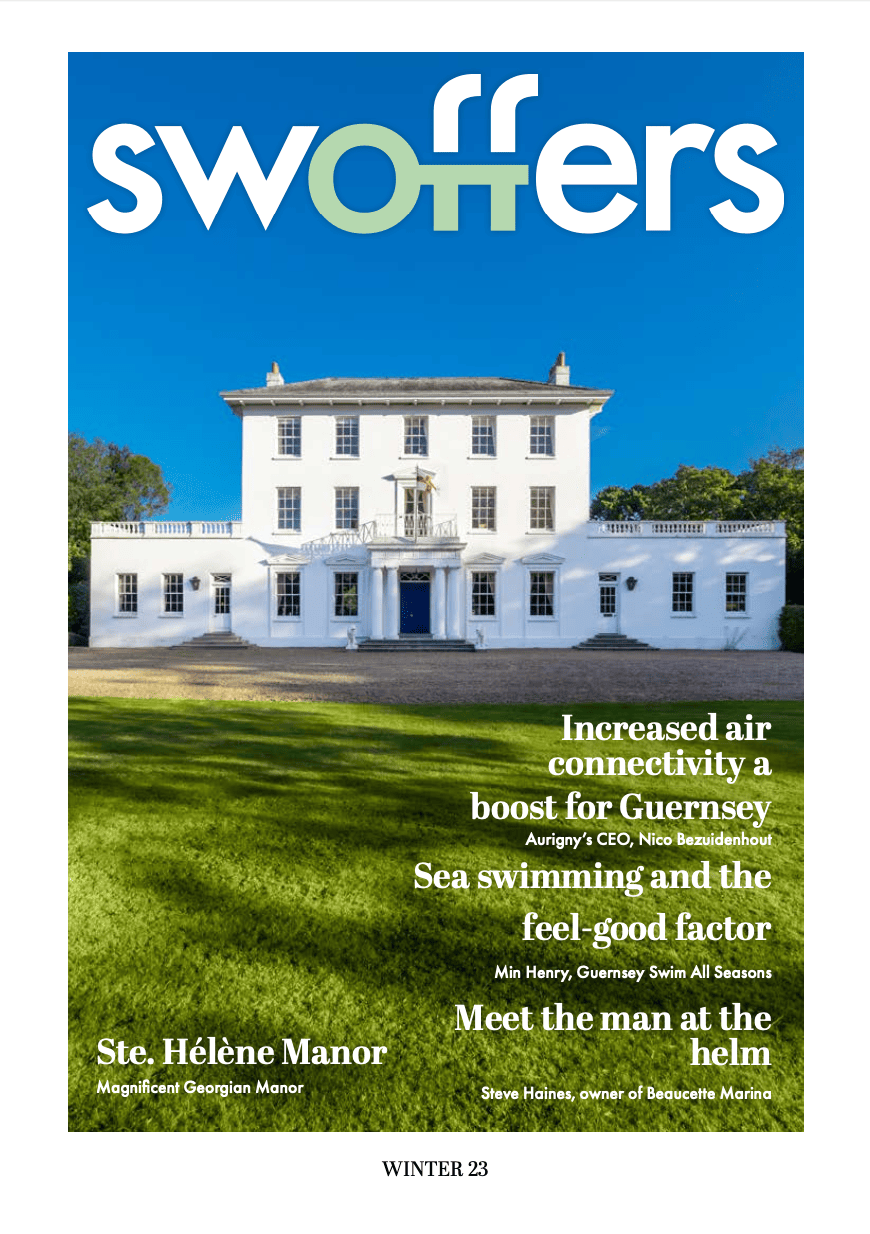The iconic Guernsey cow is not just beautiful, but the milk she produces is renowned throughout the world. We spoke to Andrew Eastabrook, Manager of Meadow Court Farm, about farming on the island and the benefits of creamy Guernsey milk.
Meadow Court’s 150-strong herd supplies milk to Guernsey Dairy, and Andrew and the farm’s owners are also very passionate about cattle genetics. ‘Essentially, the Guernsey cows on the island have a higher genetic merit than many Guernseys elsewhere around the world,’ explains Andrew. ‘So although milk is our core enterprise at the moment, we’re keen to explore the options in terms of supplying those genetics abroad.’
Andrew has plenty of experience of the Guernsey cow, a breed which was recognised in the early 1700s. His love of farming began when, whilst still at school in Surrey, he got involved with lambing and calving at a local farm. Andrew then completed a degree in Agriculture and Animal Science at Newcastle University. He went on to look after a herd of Holstein-Friesians before managing the Brymor herd of Guernseys in North Yorkshire. Most recently, Andrew set up and managed a herd of Guernseys at Hartpury College in Gloucestershire. So when he had the chance to work on the island, Andrew says, ‘The opportunity was too great for me to pass up on, in that it was at the core of where the breed has originated from and where the best genetics in the world are.’
When it’s milking time, the staff only need to call the cows and they contentedly file out of their barn or field. Andrew says: ‘The first thing that attracted me to the Guernsey cows is their temperament. They are very docile, calm animals and they like interaction with humans. So that makes everything 10 times easier.’ Cow welfare is the number-one priority at Meadow Court: ‘Happy, comfortable cows are as productive as they can be, and the more space you give a cow and the healthier she is, the more milk she produces. So from a business perspective she is a more profitable animal, but more fundamentally it’s the right thing to do. We choose to work with animals, and we’re here to serve them.’
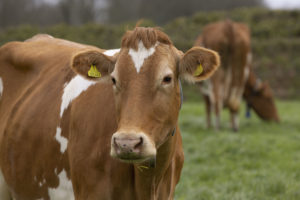
The island’s mild, ‘great grass-growing’ climate is perfectly suited to dairy farming. The Guernsey doesn’t break down the beta-carotene in grass, which is why their milk has a rich golden colour which is particularly notable in butter and ice cream. There is another advantage too: ‘There’s three times the level of Omega 3 in their milk compared to other breeds, and over 80% of Guernseys carry the A2-A2 gene, which is a specific protein which has been found to cause a lot less discomfort to consumers. A vast number of lactose-intolerant people are self-diagnosed, and are actually sensitive to A1 beta-casein, which is present in around 85% of Holstein milk.’ There is a high demand in the Middle East and Asia for A2 produce, but its benefits are not widely known in the UK.
As a relative newcomer to the island, Andrew has settled well and has found the farming community to be supportive. He has also noted a positive engagement with farming amongst people living in the island. ‘Everybody’s got some farmland within walking distance of their home, and they enjoy seeing grazing cattle. When the herd is crossing a road there can be a tailback of 10 or 15 cars waiting for us and everybody’s smiling and taking photos.’
The industry is supported by the States of Guernsey, with funding provided to ensure that the purity of the breed is maintained. An import ban was introduced in 1789, which has prevented the diluting of genetics seen elsewhere. Furthermore, only local milk is sold in shops, meaning food miles barely exist. As Andrew points out: ‘The milk isn’t produced somewhere in England then put on a boat. You can see the cows in the field, and their milk will be up at the dairy then on the shelf within a day.’
Andrew doesn’t come from a farming family, and he has observed a renewed interest in agriculture outside of the traditional route of farms being passed down through the generations. ‘It’s a really positive thing for agriculture because we’re getting ideas from other industries and we’re getting people with other life experiences,’ he says. Sustainability is key for the island, since farmers play a key role in managing the countryside, its earth banks, hedges, field margins and so on. Andrew’s advice to prospective farmers is: ‘Just go and knock on doors. Farmers don’t necessarily have time to do much on social media or go to careers fairs but if anyone’s passionate about the industry we’re happy to support that.’ One thing is for certain – the island would be a poorer place without the presence of the much-loved Guernsey cow.
Jo Stoddart would have appreciated having someone to ask for advice when she moved to Guernsey 17 years ago. Despite having lived in Paris, London and Jersey, it took time for Yorkshire-born Jo to acclimatise. Luckily for those thinking of making the island their home, Locate Guernsey is here to help.
‘When I first moved to the Channel Islands, some of the basic mistakes I made included cancelling my UK TV licence rather than just changing the address and posting a birthday card using an English stamp, not knowing that the islands each had their own stamps,’ says Jo. In addition to these practicalities, Jo and her family found their first year rather stressful, as it took time to settle in and make new friends. Jo worked for Swoffers when she first came to Guernsey, and met many people who had the same questions she’d had when she arrived. This led Jo to set up a business helping relocators move to the island, and when the position of Director of Locate Guernsey came up a few years later, it was the perfect fit.
Locate Guernsey is a government agency tasked with promoting the island to individuals and businesses as a relocation destination, and helping them to make an informed decision about whether life on the island would be right for them. ‘We seek to help people and make sure they can hit the ground running from the start, and part of that is managing their expectations and helping them to understand some of the differences which they might not be expecting. The cost of off-island travel, slightly higher food costs and other such quirks need to be considered. New residents can buy all different types of Open Market properties, but they’re likely to have a choice of three or four of each type, not 23 or 24.’ Helping people to understand what island life will be like is in everyone’s interests, as Jo explains: ‘Occasionally a relocation can go wrong because people didn’t know what to expect and if that happens it can be unpleasant for everyone involved.’
An important part of helping relocators to settle is to introduce them to like-minded people. ‘We organise quite a few social events each year and these have been really successful,’ says Jo. ‘We want those who have made a conscious decision to come here to integrate into the community if they want to. I’d say for the most part people do want to get involved, which is fantastic because we can benefit so much as a community from the experience they bring.’ Examples abound of the differences that inspirational newcomers have made to the island in areas as diverse as art, hospitality, charity and sport.
On 3rd October this year, Locate Guernsey will be holding the first ever Relocate to Guernsey Show in London, at 200 Aldersgate, St Paul’s. The purpose of this inaugural event will be to provide potential relocators with information about why they should, and how they can, relocate to Guernsey. Professionals from Guernsey such as advocates, tax advisers and estate agents will be present to provide information and answer questions, and attendees will also be able to enjoy some informative seminars about Guernsey and the relocation process. There will also be some recent relocators on hand throughout the day who will be happy to share their own stories and talk about their personal experiences of relocation to Guernsey to others who are considering making the move.
The pandemic opened many people’s eyes to the fact they could work remotely from anywhere. ‘It made a lot of people realise they no longer had to live in or near a big city, so the option to live in a safe, secure, stable and beautiful environment with a great work-life balance suddenly became more achievable,’ says Jo. A number have relocated from Hong Kong and Singapore, to be nearer to family in the UK. ‘They don’t want to live there for all kinds of reasons, but it’s only a 40-minute flight from Guernsey to London Gatwick if they need to pop over to the UK.’
Recent global events have also encouraged an increase in the number of Guernsey people returning from all over the world. People who always thought they might come home one day have decided to do so, and many of them connect with Locate Guernsey.
The consequences of Brexit have been felt in Guernsey as, due to the new immigration rules, those who are relocating for personal or wealth reasons to live in the Open Market now need to hold either a British passport or settled status in the UK. This does not affect those professionals who have been offered a job in Guernsey which qualifies for an employment permit, as they are still able to relocate for their job irrespective of their nationality. Those who do not hold a UK passport or settled status but who are looking to establish a business in Guernsey can still apply for an Entrepreneur Visa, however the Investor Visa was withdrawn in February 2022.
Jo and the team derive great satisfaction from the many success stories they have played a part in. ‘It’s part of my job to paint a picture in people’s minds of what their life in Guernsey might look like, so when that picture is even brighter than they imagined, and they say to me that life in Guernsey is even better than they thought it would be, it makes it all worthwhile.’
A kitchen fire and a global pandemic might well have forced many restaurants to close their doors. Not so for owner of two local Guernsey eateries, Steve Hopkins. Not only did Steve continue to succeed with restaurant number one, but he also started planning his second enterprise in the midst of the crisis. His friends described him at the time as everything from mad to brave. His story so far suggests the latter is probably the more accurate description.
Steve has worked in the hospitality sector for his entire career and says that he fell in love with the industry from an early age – admitting to even enjoying his first part-time job as a kitchen porter. Completing a hospitality management training programme with UK chain Hotel du Vin, Steve then spent time working in Australia and New Zealand before eventually moving to Guernsey to manage a local hotel in 2015.
‘As a child, I came to Guernsey with my family twice a year and I have amazing, happy childhood memories of those times. I also recall having conversation with my friends when we left school and telling them that I would end up in Guernsey,’ he said.
It was always a dream of Steve’s to run his own business and so when he was approached about a central St Peter Port restaurant premises, he resigned his job and ploughed everything he had into Fat Rascal.
‘The concept for Fat Rascal was inspired by brunch, all day dining, fresh changing menus and a homely intimate atmosphere. The venue had to suit that concept. We launched in February 2017, and we remained true to the original concept. Brunch took off really quickly and seemed to be a relatively new concept for Guernsey. Initiatives like our wine dinners and our bottomless brunches proved very popular – and we were enjoying ourselves.’
Only 10 months later, a kitchen fire closed the restaurant for more than three months. An excellent trading year in 2019 set the restaurant back on its feet until the Covid pandemic struck a year later. A challenging time certainly, and Steve acknowledges that the business might not have survived.
‘The one thing that picked us back up was our local loyal following. Without that, we wouldn’t have survived even the fire and certainly not the pandemic. It was hugely challenging operationally, financially, and emotionally. But we survived.’
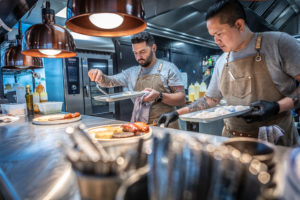
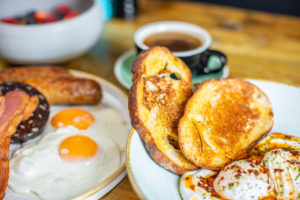
During the pandemic, Steve had his first meeting with the agents for Admiral Park, a business and residential area on the outskirts of St Peter Port, regarding the restaurant premises on the development.
‘People did question my wisdom at taking on the second restaurant, but my view was that the uncertain time we were all living through wouldn’t last forever. I wanted to look ahead to the future and this amazing opportunity wasn’t going to present itself a second time.’
The fact that the site was a blank canvas that Steve could develop to his own vision from scratch was too good to resist.
‘I knew exactly what the place was going to be. I could see it, feel it, and taste it, and it has turned out to be exactly how I had envisaged. That’s the one thing that I am most proud of – I didn’t compromise on the initial vision at any stage though at times it would have been easy to do so.’
Good Rebel opened its doors in July 2022 with its industrial feel, high ceilings, shedloads of natural light and a real ‘London vibe’ – a perfect addition to this out-of-town spot. And the name? It reflects the menu which contains a mix of healthy and not so healthy food which is successfully attracting a wide range of guests. In the week a mixture of corporate, shopping, and casual lunch visitors; at weekends young families for breakfast and long brunchers.
The next step is to open in the evenings – good news for Good Rebel regulars – sometime in May. Menus again will offer all things fresh and as much locally sourced produce as possible.
Steve took a leap at a time when many wouldn’t, and his decision seems to be paying off. His clear focus and vision have never faltered. As for future endeavours, Steve is ruling nothing out.
‘Never say never’ he said.
Leading Guernsey estate agent Swoffers has announced today that it will become the first agency in the world to staff its team of negotiators entirely with artificial intelligence (AI) robots.
The company, which celebrated its 50th anniversary last year, has always had a reputation for innovation being the first agency on the island to have a website.
Director Craig Whitman said: “Whilst we have always been a people orientated business, we are constantly looking at ways we can improve our service and when we were approached by world-leading Japanese AI company Eipurifuru International with the idea, we were very excited.”

The company has worked with Swoffers over the last year with the existing team with a plan to create the perfect estate agent.
Mr Whitman added: “The new generation of estate agent robots come with industry leading features: all our robots are programmed to never over-promise and under-deliver, they have the latest hi-tech cameras installed guaranteed to never make rooms look bigger than they actually are, and most importantly, will always tell you the truth.”
In July Guernsey will host its third Island Games. We spoke to Amanda Hibbs, the event Communications Director, about how preparations are going.
The global pandemic led to countless events being cancelled worldwide. One such casualty – a major one for Guernsey – was the NatWest International Island Games. The island had won the bid to host the biennial event in 2021 before Covid put pay to all plans. Now after a two-year delay, Guernsey is getting ready to welcome around 3,000 competitors, team managers and officials to its shores for what promises to be an exciting games in July this year.
Amanda Hibbs, the event Communications Director, has been involved since the island set out its initial hosting bid for 2021.
‘One of the first things we did at the time was to produce a risk mitigation report, but we funnily enough, we didn’t include a global pandemic. So, we postponed the event to this year.
‘The island will be the first of the 24 members of the International Island Games Association (IIGA) to have hosted the event three times – having been host in 1987 (which was the second event in its history) and 2003. Teams from all member islands will compete in 14 different sports from 8th to 14th July.’
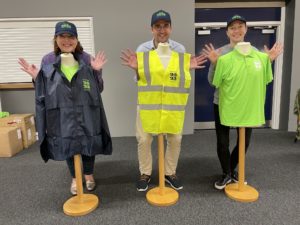

The event seems to have the community at its heart.
‘The games is bringing so many different aspects of the community together,’ said Amanda. ‘I have met lots of incredibly talented, lovely people volunteering to do so many things for us. It is amazing.’
There are around 1,100 volunteers now registered, most of whom will be involved only during the event itself doing everything from welcoming teams to acting as road marshals, driving mini buses or coordinating medal ceremonies. With more than 200 events being held at 25 different venues over seven days, the games wouldn’t happen without this number of willing volunteers.
Organisers have been keen to engage with other areas of the local community to broaden the event’s reach beyond only those already keen on sport. Local charities are getting involved: Cardiac Action Group is training volunteers in using a defibrillator and in CPR; Health Improvement Commission is working on a youth engagement programme promoting healthy lifestyles; St John Ambulance Guernsey is recruiting additional first aiders for the event – just a few examples of local community groups contributing to a successful games.
Even sports stars of tomorrow are playing a part. Primary schools will be offered resources, activities and a lesson plan on the cultures and histories of all member islands. The research and resource assets have been put together by students at Sixth Form Centre who have already run a pilot session with pupils at St Martin’s Primary School.
Technical partner Sure has carried out a survey of all locations to ensure that connectivity is fit for purpose. This will include fibre installation where needed. Sure is one of many corporate sponsors supporting the event and which have maintained their support despite its two-year postponement and the considerable rise in costs the world has seen since the pandemic – support which Amanda describes as ‘truly amazing’.
Aside from a global pandemic, the event organisation hasn’t been without its challenges – accommodation being one of the biggest. Amanda explains: ‘Accommodation is not a new problem and not unique to Guernsey. Past hosts have faced similar challenges and future ones will too. This is inevitable as the event continues to grow in popularity. But we have managed to find accommodation for everyone.’
The 2023 games will mark a couple of other firsts.
Gozo will be making its inaugural appearance at the games having been accepted as a member of the association last July. This will be the first ever time its athletes will compete in an international competition under their own flag as opposed being part of a Maltese delegation.
And there is even a new sporting event making its debut in Guernsey. Whilst the triathlon has always formed part of the games, and traditionally taken place on the first day, this year a triathlon relay will be held for the first time, giving the triathletes something to look forward to later in the week.
Guernsey will be buzzing during that week in July. The event promises to be a huge success and will have touched most parts of the local community in some way.
It’s been four years in the making, but let the games begin.
As a global finance centre and global citizen, Guernsey is adapting to the increasing demand for green investments. The Sustainable Development Goals, a collection of 17 global goals set by the United Nations, are mankind’s most ambitious effort to date to secure its future on earth. Stephanie Glover, Head of Strategy and Sustainable Finance at WE ARE GUERNSEY, provides an insight into Sustainable Finance Guernsey, which is the initiative Guernsey Finance is aiming to deliver on Guernsey’s strategic commitment to sustainable finance.
The transition to net zero requires a fundamental rewiring of our global energy system. It will drive disruptive innovation across almost every sector and every region globally. This represents an enormous financing opportunity – with estimates ranging from $125 to $350 trillion of total investment required to reach net zero by 2050.
However, the rush by asset managers to burnish their green investing credentials creates a dilemma for investors: How do they know that what they’re buying is meeting its objectives? This has been particularly relevant over the course of the last year as many ESG (Environmental, Social and Governance) focused funds have been reclassified and downgraded as rules over what can be considered ESG become stricter.
Working alongside other leading international financial centres, Guernsey is looking to tackle this issue as part of our membership of the UN-convened Financial Centres for Sustainability (FC4S) Network.
In the latest UN FC4S assessment survey, more than half (52%) of the financial centres surveyed believed that developing consistency across standards, taxonomies and guidelines was a top priority, and doing so will help alleviate some of the investor concerns over what is a green or ESG fund.
A WORLD FIRST
This is why Guernsey developed the world’s first regulated green fund regime – the Guernsey Green Fund (GGF). The GGF is essentially a kitemark designation scheme that certifies a fund’s green credentials, helping to identify truly green investments, and aligns with internationally recognised green criteria.
As of Q3 2022 £5.6 billion of investment in terms of total net asset value has been given the GGF designation in Guernsey, meaning investors in those funds can be confident that their investments are mitigating the risk of climate change. Funds receiving the kitemark have included investments in wind, solar, forestry and sustainable food technologies.
ROBUST REQUIREMENTS
To ensure that funds accredited with the GGF kitemark are genuinely offering investors a sustainable strategy, 75 per cent of a fund’s assets must be directed towards the likes of renewable energy projects, such as wind and solar farms, energy efficiency projects or low-carbon transport schemes, among other possibilities.
The remaining quarter of an investment fund’s holdings must not lessen or reduce this overarching objective of mitigating environmental damage. These exclusions follow the internationally recognised “The Climate Bonds Initiative Green Bonds Methodology – Exclusion Policy” such as fossil fuel-based power generation including ‘clean’ coal. Any fund based in Guernsey can achieve the GGF kitemark if it hits the criteria, and with the island’s international fund-buying client base, there is a real opportunity to prosper in the realm of sustainable investing.
This is vitally important, especially given that finance firms managing $130 trillion have pledged net-zero targets on the back of COP26. Ensuring this capital is used effectively and ethically will be one of the most prominent challenges for investors. However, schemes such as this will help investors, who only wish to invest in verified green industries, do just that.
STICK OR TWIST?
Debate about how to approach brown investment such as investment in fossil fuels also is raging in investment circles at present.
At one end, campaigners are urging for divestment, but more moderate voices accept the need for a managed transition. How, some investors ask, can they steer the fortunes of fossil fuel firms if they don’t have skin in the game?
This is an especially pertinent question because any fossil fuel companies that fall into private hands and away from public markets are far less likely to transition to clean energy generation as quickly due to the lack of investor scrutiny and oversight. But there will be a significant need for financial services practitioners, such as those based in Guernsey, to assist companies manage the complexities of the transition in a just and transparent manner.
Guernsey Finance conducted research, in association with Baringa Partners, on private finance and its role supporting the just transition. This research highlighted how Guernsey, as a leading international finance centre and green finance hub, can play a role disproportionate to its size in supporting the transition, with potential benefits such as growth of Guernsey’s green investment sector from £4.5bn to £56bn by 2040.
This research also highlighted that the significant opportunity for the Guernsey finance industry to drive a proactive sustainability agenda, and establish itself as a leading global centre for financing a just transition to net zero. This includes traditional sectors such as insurance and investment management, as well as the development of new specialist expertise and support services, for example around ESG, data and fintech. As a jurisdiction with over 60% of its GDP attributable to the finance sector, harnessing this opportunity could be critical to support Guernsey in remaining competitive within the context of wider movements towards sustainability in global financial markets. Key differentiators that enable Guernsey to capture this opportunity are:
- A strong track-record for innovation
- An engaged, supportive regulator
- Fast, easy access to global markets
- A strong, stable, trusted home for private capital
- A trusted home of specialist solutions
- A strong pool of experienced advisors
HOLISTIC APPROACH
It is also important to ensure that investors don’t focus solely on greenhouse gas emissions and carbon within their sustainable investment portfolios, and this view point is only growing in importance.
Many other factors, including biodiversity, are extremely important for the health of the planet, and subsequently humanity. This is why Guernsey has created another world first Natural Capital Fund regime, which supports the GGF kitemark and add to the ecosystem of sustainable finance in Guernsey. This regime will offer the same benefits to investors as the GGF such as transparency and confidence in the sustainability criteria of their investments, but with a focus on natural capital and nature positive investments.
Essentially, sustainability can no longer be an adjunct for investor portfolios; ESG (environmental, social and governance) decisions need to be factored into every investment decision. And it’s because of this that investors need a proactive finance centre like Guernsey steering them towards the most authentic sustainable investments.
Guernsey has a long history of football, dating back to as far as 1893, when the Guernsey Football Association was first established. Since then a number of local players have graced the stage at national level, arguably the most famous of whom being Matt Le Tissier who played for Southampton and England.
The island continues to produce elite players, two currently playing for England and another three for national teams. Now, however, local training has taken on a whole new dimension in the shape of a dedicated high tech football arena – Aztech Soccer.
The arena was the brainchild and life-long dream of owner Rob Jones, which he now runs with his business partner, Tony Vance. Rob’s early memory of playing football is kicking a ball endlessly against a garden wall with a painted goal mouth, but his love for the game crystallised when he visited Anfield as a young boy. He still recalls that feeling of utter amazement when he entered the stadium for the first time and since then, has always wanted to create his own centre and see youngsters react in a similar way.
And why wouldn’t they? The facility has both indoor and outdoor pitches, a café serving snacks and drinks and a contemporary style restaurant overlooking the indoor areas. But what sets the arena apart is the cutting-edge equipment in the Tech Zone – which is enough to get even those who are luke-warm towards the game excited and itching to have a go.
Visitors can either become members or ‘pay-as-you-go’ users (fees are extremely reasonable in line with Rob’s vision of the arena being accessible to all) and on registering are given a wrist band that tracks their own individual performance on the various pieces of equipment. Individuals can compete against their friends, other high-profile users or just themselves and all data is stored in the Cloud for their next visit. The equipment tests and improves fitness, passing accuracy, goal scoring, reflex speed and much more – all of which can be done without the need for 21 other players and a referee. With a wide range of challenges built into the kit, it will appeal to players looking for serious football fitness training as well as those who just want a bit of fun.

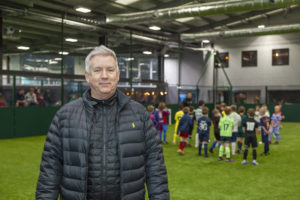
Rob himself has always been active on the local soccer scene, since he moved to the island with his parents at the age of 18. He played for many years for Vale Rec – one of the seven local clubs – and is proud of (in his own words) his Muratti cap. He now plays for the Guernsey over-50s Super Vets and following a 35-year career in the finance sector he has finally been able to realise his dream.
The biggest challenge was finding the right site and the search took several years. But once the purchase of the building was secured, the site was transformed from its previous use as an indoor cricket centre to the state-of-the-art facility it has now become, in only nine months. The arena opened its doors on 1 November 2022
If Guernsey hasn’t ever seen anything quite like Aztech Soccer, neither has most of the UK population. With the exception of one comparable centre in Bournemouth, Guernsey seems to be leading the charge, and Rob intends to stay a step ahead.
He and Tony have a close working relationship with the equipment manufacturers ESA, so will be made aware of the latest technological developments, but for now he is delighted to be ahead of the game and sees that as a real feather in Guernsey’s cap.
As well as creating a training facility to develop Guernsey’s next generation of elite players, Rob’s vision is for Aztech Soccer to become a hub for the community. Memberships start from the age of seven years, but groups of any ages can hire the pitches and he is in discussion with schools and playgroups to develop usage during the day to complement the after-school soccer clubs. Corporate team building and social events are another potential target.
Part of his vision is also to create a safe space where young girls can come and train together. With local player Maya Le Tissier in the England squad, the girls have the perfect role model.
Rob is a role model in his own right and has created something amazing – a world away from a painted goal mouth on his garden wall.
Towards the end of last year, Swoffers announced a three-year sponsorship deal to support Liberte Netball Club. The financial support covers player registration fees, match and training court fees, and new dresses and hoodies.
Natalie Carre, the chairman of Liberte Netball Club, said the financial commitment from Swoffers had put the club, which was founded in 2019, in a strong position.
“Having the support from Swoffers has been really important for us. Their support has meant that we’ve been able to provide training for every single one of the teams,’ she said.
‘It’s been really good for us. We’re all kitted out now, we’ve got the Swoffers logo on us and we’re all very proud to wear it.’
Swoffers caught up with the club at one of its training sessions. Watch the video here:
It has been 20 years since Guernsey last hosted an Island Games and the competition will be coming back to the island bigger and better than ever before this July. At Swoffers we are passionate about supporting women in sport, and even have our very own shooting superstar competing in the Games. Nikki Trebert, our senior property manager, will be facing nine other islands to win a medal in the shooting events. We spoke with Nikki to find out why she loves the sport and more about the competition.
How did you get into shooting?
I’ve been shooting since I was 14. It was a sport we had the opportunity to try at school. I really enjoyed it so joined the Guernsey Pistol Club and realised I was actually quite good at it.
I then entered the Junior British Championships and won! And it just continued from there. I have now been shooting for 32 years and have been lucky enough to participate in many international competitions including two Commonwealth Games (Glasgow in 2014 and Gold Coast in 2018).
How many medals have you won?
In total I’ve won ten gold medals, six silver and five bronze.
Which pistols do you use?
I use an air pistol pellet gun which is for indoor use and has a shooting range of 10m. I also use a .22 pistol for outdoors which has a 25m range and much smaller bullets.
What do you enjoy about shooting?
I find it really calming, it allows my mind to focus and forget about the rest of the world. My favourite discipline is 25m Pistol, which has 2 parts, you shoot 30 shots precision and 30 shots rapid at turning paper targets. The rapid section is my favourite; each shot has to be taken within three seconds, there is no time to overthink the shot so I just concentrate on technique and do not think about nerves.
How many Island Games have you competed in?
This will be my 10th Island Games. My first one was in Jersey in 1997. This year though I will not only be competing but also helping organise the shooting competitions as the Island Games Pistol Co-ordinator.
Which Island Games events will you be competing in this year?
I will be competing in the ladies’ standard pistol on 11 July. This is where 20 shots of five shots are fired in under 150 seconds, 20 seconds, and 10 seconds. On 13 July I’m competing in the 25m sport pistol event.
There are both individual and team competitions. For the team events I will be partnering with Tara Leighton-Dyson, a very strong shooter, and our scores will be combined.
I’m yet to qualify for the air pistol events as there are more qualifying competitions to still take place. I am hoping to qualify for the ladies’ air pistol events which will be shot on electronic targets – a first for Guernsey.
What are you looking forward to for this year’s Island Games?
I’m looking forward to welcoming the other Island shooters to Guernsey’s home range. We’ve met many times before and, even though we are competing against each other, it’s like a big family.
I also would love to win a medal. The strongest competition will be Jersey, Gibraltar, Gotland, and Isle of Wight.
How have you been preparing?
I train four times a week, but closer to the Games I’ll up this to five times. I’ve been practising at the outdoor range at Chouet, and, when its dark in the evenings, at the indoor range. Practising outside helps to train for different weather conditions and lighting. I also train at home doing dry firing where no bullets are used. This helps me practice my trigger control, timing, lifts, and visualisation.
The Island Games is the first competition I’ve taken part in since the 2019 Gibraltar Island Games due to Covid. I’m hoping to go to France in April to compete and to go to the Channel Island Championships in Jersey so I can practice under competition pressures.
What’s new to this year’s Games?
The use of electronic targets for the air pistol and air rifle events. They will provide instant results, and the technology will enable people to view the targets online and watch the shooting event. Perhaps not an advantage for Guernsey air shooters, as the range will only be assembled just before the Games, so it will be a new temporary range at Aztec Centre.
After the games they will stay on island, which will massively benefit local shooters, especially when preparing for national competitions; so a brilliant legacy of the Games. Unfortunately spectators will not be able to view the full bore disciplines at Chouet, due to a lack of space on the range. But there will hopefully be a camera, so people can log on to livestream the shooting events.
How can others get into shooting?
I’d recommend trying Air Pistol or Air Rifle at the Cobo United Air Rifle Club Cobo-arc.co.uk. For those who wish to shoot Pistol, more details can be found on guernseypistolclub.com. It would be great if more people could get into the sport.
Just before Christmas, Swoffers – the island’s most experienced estate agents – launched its Big Property Survey, and almost 1,300 people responded. The results are in, and we have a sneak preview for you. In short, Guernsey people love their island, they love their houses, and they really love their cars!
Following the end of the post-Covid property explosion, the last quarter of 2022 saw activity stabilise and us estate agents were able to get back to what we love the best – talking to people and finding the perfect property for our loyal clients. We wanted to get a snapshot of what was making people tick, their likes and dislikes, as well as the things that kept them awake at night. So, we launched our Big Property Survey, which has yielded some interesting results.
It’s heart-warming to note that while many communities yearn for something bigger and better, overall people in Guernsey seem happy with their lot. It appears the grass isn’t always greener, and the island’s charm still holds the hearts of its local population.
The survey was split into three sections – for renters, homeowners and non-islanders – with some questions allowing respondents to highlight their top three answers, and others asking for a single response. Overwhelmingly, islanders said they appreciated the safety and quality of life that we are blessed with in Guernsey; three-quarters of respondents listed these in the top three best things about living on the island. Respondents who took the survey but don’t live in Guernsey said the same. Many were born in Guernsey and had moved away, or had family in Guernsey; almost all wished they could live on the island, or intended to move back at some point.
We didn’t want to be one-sided, so we asked what the worst thing about living in Guernsey was. Unsurprisingly, based on the average house price alone, the cost of living was a concern (77.8%). The cost of getting off the island was also raised as an issue by 84.5% of survey participants. What really struck us was just how appreciative islanders are of their own homes, whatever the size. Faced with the option of choosing the answers: “I love my house”, “I wish my house was bigger, but I can’t afford to move”, and “My house needs an upgrade”, the vast majority (46%) said they loved their home, with 22% saying their house could do with an upgrade and 15% saying they would like more space but were restricted by cost.
In terms of what buyers look for in a new property, it is overwhelmingly a garden and parking, with parking nudging ahead slightly. School catchments were at the bottom of the list, indicating that the island has a spread of good schools. Out of 862 responses to the question: “What is most important to you in a new home?” 618 placed parking in their top 3, with 589 listing the need for a garden and 564 including location.
The biggest dealbreaker, again, was having no parking. 42% of respondents choose no parking as being a barrier to buying a property. Being above budget was in second place (22% said this), while having no garden was third, with 19% of the vote. People are more prepared to go over budget than buy somewhere without parking!
“It appears the grass isn’t always greener, and the island’s charm still holds the hearts of its local population.”
Local homeowners were also questioned on how they look for a new property and the role of estate agents; we were very happy to see that more than half agreed or strongly agreed that Swoffers was the island’s most trusted estate agent.
In terms of finding properties to buy, the island showed its commitment to online activity, with the vast majority saying they would look on estate agents’ websites or social media.
See the full results here.
If you’re looking to relocate to Guernsey, or live in Guernsey and are thinking of moving, get in touch with one of our friendly team.
Call 01481 711766 or email sales@swoffers.co.uk
